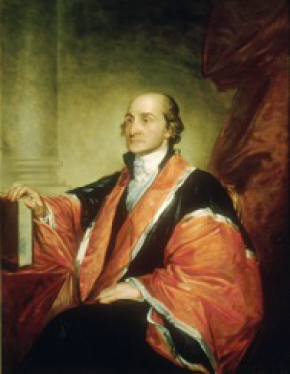You are here
Circuit Court Opinions:
Chief Justice John Jay, Henfield’s Case (1793)

Henfield’s Case, 11 F. Cas. 1099 (C.C.D. Pa. 1793) (No. 6,360) [Middle Circuit]
Some scholars describe Henfield’s Case as the first major criminal prosecution in the federal courts. While Chief Justice Jay did not preside over the trial, a grand jury charge he delivered at the U.S. Circuit Court for the District of Virginia in May 1793 formed the basis for the prosecution. Years later, Jay’s charge was published in the case reporter immediately preceding the grand and petit jury charges given by Justice James Wilson, who presided over Henfield’s Case.
Henfield’s Case occurred in 1793, a turbulent time in world affairs. French revolutionaries had recently executed King Louis XVI and declared war on Great Britain and Holland. Controversial French minister to the United States Edmond-Charles Genêt (frequently known as Citizen Genêt) arrived immediately thereafter to campaign for American support. Genêt threatened to appeal directly to the American people, bypassing normal diplomatic channels. An irritated President George Washington, who proclaimed the neutrality of the United States in the conflict two weeks after Genêt’s arrival in April 1793, requested Genêt’s recall a few months later.
Amidst this tension, Gideon Henfield, an officer on the French privateering ship Citoyen Genêt, which seized a British vessel on May 3, was arrested when he brought the British ship into port at Philadelphia. Because the United States and Great Britain were at peace, Henfield was accused of violating the law of nations by committing an act of war and defying Washington’s days-old proclamation of neutrality.
Beyond its significance to America’s state of neutrality, Henfield’s Case was notable because no precedent existed for the federal prosecution of a common law crime (i.e., a crime not defined by congressional statute). In his earlier grand jury charge, Jay had identified the “laws of nations” as part of the supreme law of the United States along with the Constitution, statutes, and treaties. He defined the laws of nations as “those laws by which nations are bound to regulate their conduct toward each other, both in peace and war.” Jay then alluded to Washington’s proclamation as espousing the law of nations, the violation of which would be punished in the federal courts.
Wilson then gave a similar charge to the Pennsylvania federal grand jury that indicted Henfield (the government had both Jay’s and Wilson’s charges printed for the purpose of explaining its position to foreign nations). With Wilson, Justice James Iredell, and U.S. District Judge Richard Peters presiding, Henfield was tried before a jury, which acquitted him. Congress passed the Neutrality Act the following year. Other prosecutions for nonstatutory offenses, such as piracy, took place in federal court until the Supreme Court declared common law prosecutions unconstitutional in United States v. Hudson and Goodwin (1812).
